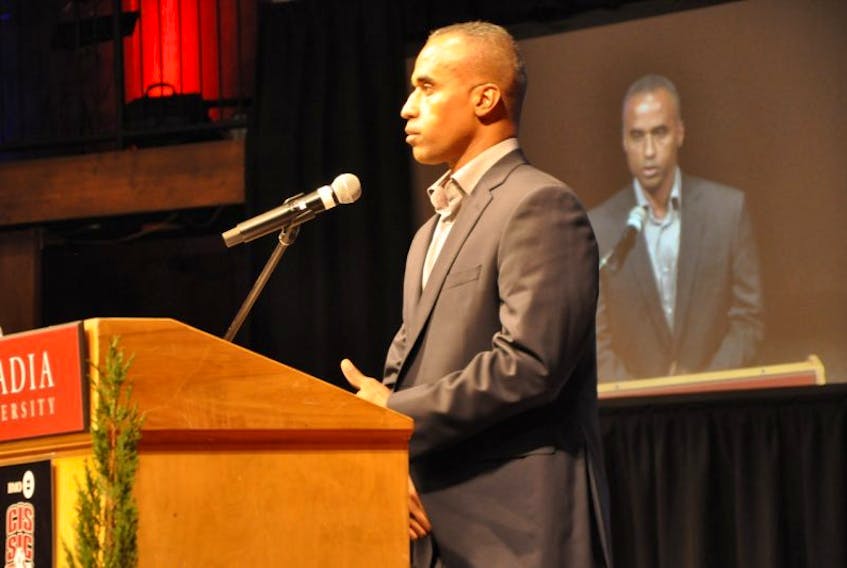Coach of the Year Award recipient Peyvand Mossavat of the University of Ontario Institute of Technology devoted a few minutes to soccer talk in his acceptance speech, then urged the student-athletes in attendance to pay close attention.
“Today I have to take the opportunity at this platform to talk about something bigger and more important,” saidMossavat, addressing a crowd predominantly populated with players from the eight CIS women’s teams in the country that advanced to the championship tournament Acadia agreed to host from Nov. 10-13.
“My talk today is about mental health and drug addiction.”
Citing information gleaned from the Canadian Mental Health Association, Mossavat said one in five people are likely to experience challenges relating to mental illness or substance use in their lifetime.
Some of those people, he said, will live in fear of judgment, discrimination, alienation, unemployment and even homelessness.
“Would you shy away from them or not support them?,” Mossavat asked.
Mossavat posed this question with former World Cup soccer captain and award-winning national coach Paul James in mind.
Few people knew that James, a Canadian soccer sensation, was secretly battling a crack cocaine addiction. And things took a drastic turn when the famed fullback turned high-level coach went public with his story.
In spite of leading teams to four CIS national championships, five division titles and three Ontario University Athletics (OUA) championships in a six-year period, Mossavat said James is now frequently dismissed as unemployable.
“Paul is currently fighting a human rights case in the Supreme Court of Canada and every step of the way he is faced with nothing but discrimination, [and] unimaginable corruption at the highest level. How can this be?”
After being forced to resign from a job as a master coach, Mossavat said James suffered from anxiety, stress and depression.
“I went to see him a few weeks ago and found him weak and frail.”
James has liquidated his assets, lost his savings, experienced homelessness and worked odd jobs to get by, Mossavat said.
“Paul was my coach, a good friend and a mentor in soccer and in life. I’m gutted for him and I’m sick to my stomach that he goes through this every day, but I’m proud of him because he finds the strength every day to get up and fight discrimination, stigma and the corruption at the highest level,” said Mossavat, who would shortly earn a standing ovation after dedicating his award to James.
“He deserves justice and he needs help.”
James challenged all in attendance at the CIS gala, and particularly the next generation of leaders, to be that shoulder to lean on when someone suffering from mental illness or addiction needs support.
“You will have the opportunity to change things… if you are aware of what it means to battle drug addiction, what it means to suffer from mental health,” he said.
Coach of the Year Award recipient Peyvand Mossavat of the University of Ontario Institute of Technology devoted a few minutes to soccer talk in his acceptance speech, then urged the student-athletes in attendance to pay close attention.
“Today I have to take the opportunity at this platform to talk about something bigger and more important,” saidMossavat, addressing a crowd predominantly populated with players from the eight CIS women’s teams in the country that advanced to the championship tournament Acadia agreed to host from Nov. 10-13.
“My talk today is about mental health and drug addiction.”
Citing information gleaned from the Canadian Mental Health Association, Mossavat said one in five people are likely to experience challenges relating to mental illness or substance use in their lifetime.
Some of those people, he said, will live in fear of judgment, discrimination, alienation, unemployment and even homelessness.
“Would you shy away from them or not support them?,” Mossavat asked.
Mossavat posed this question with former World Cup soccer captain and award-winning national coach Paul James in mind.
Few people knew that James, a Canadian soccer sensation, was secretly battling a crack cocaine addiction. And things took a drastic turn when the famed fullback turned high-level coach went public with his story.
In spite of leading teams to four CIS national championships, five division titles and three Ontario University Athletics (OUA) championships in a six-year period, Mossavat said James is now frequently dismissed as unemployable.
“Paul is currently fighting a human rights case in the Supreme Court of Canada and every step of the way he is faced with nothing but discrimination, [and] unimaginable corruption at the highest level. How can this be?”
After being forced to resign from a job as a master coach, Mossavat said James suffered from anxiety, stress and depression.
“I went to see him a few weeks ago and found him weak and frail.”
James has liquidated his assets, lost his savings, experienced homelessness and worked odd jobs to get by, Mossavat said.
“Paul was my coach, a good friend and a mentor in soccer and in life. I’m gutted for him and I’m sick to my stomach that he goes through this every day, but I’m proud of him because he finds the strength every day to get up and fight discrimination, stigma and the corruption at the highest level,” said Mossavat, who would shortly earn a standing ovation after dedicating his award to James.
“He deserves justice and he needs help.”
James challenged all in attendance at the CIS gala, and particularly the next generation of leaders, to be that shoulder to lean on when someone suffering from mental illness or addiction needs support.
“You will have the opportunity to change things… if you are aware of what it means to battle drug addiction, what it means to suffer from mental health,” he said.









